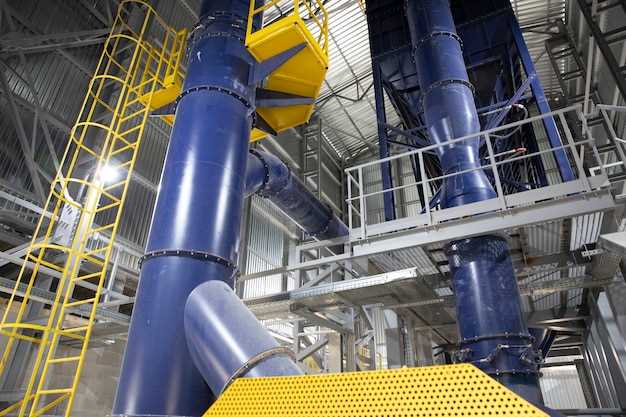
In the realm of manufacturing and production, there exists a crucial element that propels numerous chemical reactions forward, enabling the creation of a wide array of products. This essential component, often referred to as a catalyst, plays a pivotal role in expediting and enhancing the efficiency of various industrial processes. By facilitating chemical transformations without being consumed in the reaction, catalysts act as catalysts for progress, driving innovation and advancement in numerous sectors.
One of the key aspects that sets catalysts apart is their ability to accelerate chemical reactions by lowering the activation energy required for the process to occur. This reduction in energy barrier enables reactions to take place at lower temperatures and pressures, resulting in significant energy savings and cost reductions for industrial operations. Moreover, catalysts enable the production of high-quality products by promoting selectivity, allowing specific desired reactions to occur while suppressing unwanted side reactions.
Furthermore, catalysts possess the remarkable ability to increase the rate of reaction without being consumed in the process. This unique characteristic makes catalysts highly efficient and cost-effective, as they can be reused multiple times, thereby reducing the need for frequent replacement and minimizing waste generation. Additionally, catalysts can be tailored and optimized to suit specific industrial requirements, ensuring optimal performance and maximum productivity.
From the production of fuels and chemicals to the synthesis of pharmaceuticals and the purification of gases, catalysts play an indispensable role in a multitude of industrial processes. Their presence not only expedites reactions but also enables the development of sustainable and environmentally friendly manufacturing practices. By promoting cleaner and more efficient processes, catalysts contribute to the reduction of harmful emissions and the conservation of resources, aligning with the global efforts towards a greener and more sustainable future.
The Role of Catalysts in Industrial Processes
Catalysts play a crucial role in driving and enhancing various chemical reactions that occur in industrial settings. These agents, often referred to as facilitators, are essential components in the production of a wide range of products. By accelerating the rate of reactions and lowering the energy required for them to occur, catalysts enable industrial processes to be more efficient and cost-effective.
Within industrial processes, catalysts act as catalysts, promoting the transformation of reactants into desired products. They facilitate the conversion of raw materials into valuable substances, such as fuels, chemicals, and pharmaceuticals. By providing an alternative reaction pathway with lower activation energy, catalysts enable reactions to proceed at a faster rate, resulting in increased production rates and improved yields.
Moreover, catalysts also play a vital role in controlling the selectivity of reactions. They can influence the specific products formed by favoring certain reaction pathways over others. This selectivity is crucial in industries where the production of specific compounds is desired, as it allows for the optimization of processes and the reduction of unwanted by-products.
In addition to their role in enhancing reaction rates and selectivity, catalysts also contribute to the sustainability of industrial processes. By enabling reactions to occur at lower temperatures and pressures, catalysts reduce the energy consumption and environmental impact associated with these processes. They enable the use of milder reaction conditions, leading to reduced emissions and waste generation.
Overall, catalysts are indispensable in industrial processes, playing a multifaceted role in driving reactions, controlling selectivity, and promoting sustainability. Their ability to accelerate reactions, enhance yields, and reduce energy requirements makes them essential components in various industries, ranging from petrochemicals to pharmaceuticals. Understanding and harnessing the power of catalysts is crucial for the advancement and optimization of industrial processes.
| Benefits of Catalysts in Industrial Processes |
|---|
| Enhanced reaction rates |
| Improved selectivity |
| Increased production rates |
| Optimized process efficiency |
| Reduced energy consumption |
| Lower environmental impact |
Understanding Catalysts: A Key to Industrial Efficiency
In the realm of industrial processes, the role of catalysts cannot be overstated. These essential components play a pivotal role in enhancing efficiency and driving progress in various sectors. By facilitating chemical reactions, catalysts enable the transformation of raw materials into valuable products, while minimizing energy consumption and reducing waste. Understanding the intricate workings of catalysts is crucial for optimizing industrial processes and achieving sustainable development.
Unleashing the Power of Catalysts

Catalysts act as agents of change, accelerating chemical reactions without being consumed in the process. They provide an alternative pathway for reactions to occur, lowering the activation energy required and increasing the rate of reaction. This ability to speed up reactions enables industries to produce larger quantities of desired products in shorter timeframes, leading to improved productivity and profitability.
Moreover, catalysts enable selective reactions, allowing for the production of specific compounds while minimizing the formation of unwanted byproducts. This selectivity is crucial in industries such as pharmaceuticals, where the synthesis of complex molecules requires precise control over reaction pathways. By utilizing catalysts, manufacturers can achieve higher yields of desired products and reduce the need for costly purification processes.
Enhancing Efficiency and Sustainability
Industrial processes often involve complex reactions that require high temperatures and pressures. Catalysts play a vital role in reducing the energy requirements of these processes, making them more economically viable and environmentally friendly. By lowering the operating temperatures and pressures, catalysts help to minimize energy consumption and decrease greenhouse gas emissions.
Furthermore, catalysts enable the utilization of alternative feedstocks and renewable resources, contributing to the shift towards a more sustainable industrial landscape. They enable the conversion of biomass, waste materials, and carbon dioxide into valuable products, reducing reliance on fossil fuels and promoting the circular economy.
- Optimizing reaction conditions
- Increasing reaction rates
- Minimizing waste generation
- Promoting resource efficiency
- Driving innovation and technological advancements
In conclusion, understanding catalysts and their role in industrial processes is essential for achieving efficiency, sustainability, and progress. By harnessing the power of catalysts, industries can unlock new possibilities, optimize their operations, and contribute to a more sustainable future.
Enhancing Chemical Reactions: Catalysts as Reaction Accelerators
In the realm of chemical reactions, there exists a crucial element that holds the power to significantly enhance the speed and efficiency of these reactions. This element, known as a catalyst, plays a vital role in accelerating the progress of chemical transformations without being consumed in the process. By facilitating the formation of new bonds and lowering the activation energy required for reactions to occur, catalysts act as catalysts as reaction accelerators, driving industrial processes forward.
Within the vast landscape of industrial processes, catalysts serve as indispensable tools for optimizing the production of various substances. Whether it be the synthesis of pharmaceuticals, the production of fuels, or the creation of polymers, catalysts enable these processes to occur at a much faster rate, ultimately increasing productivity and reducing costs. By providing an alternative reaction pathway with lower energy barriers, catalysts enable reactions to proceed under milder conditions, saving both time and resources.
One of the key advantages of catalysts as reaction accelerators is their ability to promote selectivity in chemical reactions. Through their unique molecular structures and surface properties, catalysts can selectively activate certain molecules or functional groups, leading to the desired products while minimizing unwanted side reactions. This selectivity not only improves the overall efficiency of industrial processes but also contributes to the development of more sustainable and environmentally friendly practices.
Furthermore, catalysts play a crucial role in the field of renewable energy. As the world continues to seek alternative sources of energy, catalysts are instrumental in facilitating the conversion of renewable resources, such as biomass or sunlight, into usable forms of energy. By enabling the efficient conversion of these resources, catalysts contribute to the advancement of sustainable energy technologies and the reduction of reliance on fossil fuels.
In conclusion, catalysts serve as invaluable assets in industrial processes, acting as reaction accelerators that enhance the speed, efficiency, and selectivity of chemical reactions. By providing alternative reaction pathways and lowering energy barriers, catalysts enable reactions to occur under milder conditions, ultimately driving productivity and reducing costs. Additionally, catalysts play a vital role in the development of sustainable energy technologies, contributing to the advancement of renewable energy sources. The significance of catalysts in enhancing chemical reactions cannot be overstated, as they continue to shape and revolutionize various industries.
Catalysts: Enabling Sustainable and Green Industrial Practices
In the realm of sustainable and environmentally friendly industrial practices, catalysts play a pivotal role in driving positive change. These essential agents facilitate and accelerate chemical reactions, enabling industries to achieve their goals while minimizing their impact on the environment. By harnessing the power of catalysts, industries can embrace greener processes, reduce waste generation, and enhance resource efficiency.
With catalysts at the forefront, industries can embark on a transformative journey towards sustainability. These catalysts act as catalysts for change, driving the adoption of cleaner technologies and processes. By promoting the efficient use of raw materials and energy, catalysts enable industries to achieve their production targets while reducing their carbon footprint.
Moreover, catalysts enable the conversion of harmful pollutants into less harmful or even beneficial substances. They facilitate the removal of toxic compounds from industrial emissions, helping to mitigate air and water pollution. Through their catalytic action, industries can comply with stringent environmental regulations and contribute to the preservation of ecosystems and human health.
Furthermore, catalysts promote the circular economy by enabling the recycling and reuse of materials. They facilitate the conversion of waste products into valuable resources, minimizing the need for virgin materials and reducing the overall environmental impact of industrial processes. By embracing the principles of sustainability, industries can create a closed-loop system where waste is transformed into valuable inputs, fostering a more sustainable and resource-efficient future.
In conclusion, catalysts are indispensable in enabling sustainable and green industrial practices. Their ability to accelerate reactions, promote cleaner technologies, and facilitate the conversion of pollutants and waste into valuable resources makes them essential agents of change. By harnessing the power of catalysts, industries can pave the way for a more sustainable future, where economic growth and environmental stewardship go hand in hand.
Catalysts in Petrochemical Industry: Revolutionizing Fuel Production
The petrochemical industry has undergone a remarkable transformation in recent years, thanks to the revolutionary role of catalysts in fuel production. These catalysts have played a pivotal role in enhancing the efficiency and sustainability of the industry, leading to significant advancements in the production of fuels.
One of the key benefits of catalysts in the petrochemical industry is their ability to accelerate chemical reactions without being consumed in the process. This unique characteristic allows catalysts to facilitate the conversion of raw materials into valuable fuel products, such as gasoline, diesel, and jet fuel, with increased efficiency and reduced energy consumption.
Moreover, catalysts enable the petrochemical industry to optimize the production process by selectively promoting desired reactions and inhibiting unwanted side reactions. This selectivity ensures the production of high-quality fuels while minimizing the formation of harmful by-products, thereby contributing to a cleaner and more sustainable fuel production process.
Furthermore, catalysts in the petrochemical industry have also played a crucial role in the development of novel fuel production technologies. Through continuous research and innovation, catalysts have enabled the industry to explore alternative feedstocks, such as biomass and waste materials, for fuel production. This diversification of feedstocks not only reduces reliance on fossil fuels but also contributes to the overall sustainability of the industry.
In addition to their impact on fuel production, catalysts have also revolutionized the petrochemical industry by enabling the production of value-added products. By modifying the composition and structure of catalysts, researchers have been able to develop processes that produce specialty chemicals and polymers, which find applications in various industries, including automotive, construction, and electronics.
In conclusion, catalysts have emerged as a driving force in the petrochemical industry, revolutionizing fuel production and paving the way for a more sustainable and efficient future. Their ability to enhance reaction rates, selectivity, and diversify feedstocks has not only improved the efficiency of fuel production but also enabled the development of value-added products. As the industry continues to evolve, catalysts will undoubtedly remain at the forefront of innovation and progress.
Catalysts in Pharmaceutical Industry: Advancing Drug Synthesis
The role of catalysts in the pharmaceutical industry is pivotal in propelling the progress of drug synthesis. These agents play a crucial role in accelerating chemical reactions, enhancing efficiency, and enabling the development of innovative pharmaceutical compounds. By facilitating the transformation of raw materials into valuable drugs, catalysts have revolutionized the field of drug synthesis, leading to the discovery of life-saving medications and improving the overall quality of healthcare.
Enhancing Reaction Rates and Efficiency
Catalysts in the pharmaceutical industry act as catalysts by increasing the rate of chemical reactions without being consumed in the process. They provide an alternative reaction pathway with lower activation energy, allowing reactions to occur at milder conditions and reducing the energy requirements. This not only speeds up the synthesis process but also minimizes the formation of unwanted by-products, leading to higher yields and improved efficiency.
Enabling Selective Synthesis and Functional Group Transformations

Catalysts also enable selective synthesis, allowing chemists to target specific functional groups or stereoisomers during drug synthesis. They can promote the formation of desired chemical bonds while suppressing undesired reactions, thus facilitating the production of pure and structurally complex pharmaceutical compounds. Additionally, catalysts can facilitate functional group transformations, enabling the modification of existing drug molecules to enhance their efficacy, stability, or bioavailability.
- Catalytic Hydrogenation: A commonly used catalytic process in the pharmaceutical industry, it involves the addition of hydrogen to unsaturated bonds, leading to the reduction of functional groups or the saturation of double bonds.
- Enzymatic Catalysis: Biological catalysts, such as enzymes, are utilized to catalyze specific reactions in drug synthesis. Enzymes offer high selectivity and mild reaction conditions, making them valuable tools in pharmaceutical research and production.
- Transition Metal Catalysis: Transition metal complexes are widely employed as catalysts in pharmaceutical synthesis due to their ability to activate and manipulate various chemical bonds. These catalysts enable the synthesis of complex molecules with high efficiency and selectivity.
In conclusion, catalysts play a crucial role in advancing drug synthesis in the pharmaceutical industry. By enhancing reaction rates, enabling selective synthesis, and facilitating functional group transformations, catalysts contribute to the development of innovative pharmaceutical compounds and the improvement of healthcare outcomes.
Catalysts in Environmental Protection: Mitigating Industrial Pollution
Addressing the pressing issue of industrial pollution is a paramount concern in today’s world. In this section, we will explore the pivotal role that catalysts play in safeguarding the environment and mitigating the adverse effects of industrial activities. By facilitating chemical reactions, catalysts enable industries to minimize their environmental footprint and promote sustainable practices.
One of the key advantages of catalysts in environmental protection is their ability to enhance the efficiency of industrial processes while reducing the consumption of resources. By accelerating chemical reactions, catalysts enable industries to achieve the desired outcomes with lower energy inputs, thereby minimizing the overall environmental impact. This not only leads to cost savings but also helps in conserving natural resources and reducing greenhouse gas emissions.
Furthermore, catalysts play a crucial role in reducing the release of harmful pollutants into the environment. Through their unique properties, catalysts enable the conversion of toxic substances into less harmful forms, preventing their dispersion into the air, water, and soil. This not only helps in preserving the quality of natural ecosystems but also safeguards human health by minimizing exposure to hazardous pollutants.
- Catalysts promote the removal of harmful gases, such as nitrogen oxides (NOx) and sulfur oxides (SOx), from industrial emissions. By facilitating the conversion of these pollutants into less harmful compounds, catalysts aid in reducing air pollution and the formation of smog.
- Catalytic converters in vehicles are another example of catalysts in environmental protection. They convert harmful exhaust gases, such as carbon monoxide (CO), nitrogen oxides (NOx), and hydrocarbons (HC), into less toxic substances, significantly reducing the emission of pollutants into the atmosphere.
- In wastewater treatment plants, catalysts are employed to break down organic pollutants and remove heavy metals, ensuring that the discharged water meets the required environmental standards.
Moreover, catalysts also contribute to the development of innovative and sustainable industrial processes. By enabling the utilization of alternative feedstocks and renewable resources, catalysts facilitate the transition towards greener and more environmentally friendly production methods. This not only reduces reliance on fossil fuels but also fosters the development of a circular economy, where waste materials are transformed into valuable resources through catalytic processes.
In conclusion, catalysts play a vital role in environmental protection by mitigating industrial pollution. Through their ability to enhance efficiency, reduce harmful emissions, and promote sustainable practices, catalysts enable industries to operate in a more environmentally responsible manner. Embracing the use of catalysts in industrial processes is crucial for achieving a greener and more sustainable future.

Leave a Reply